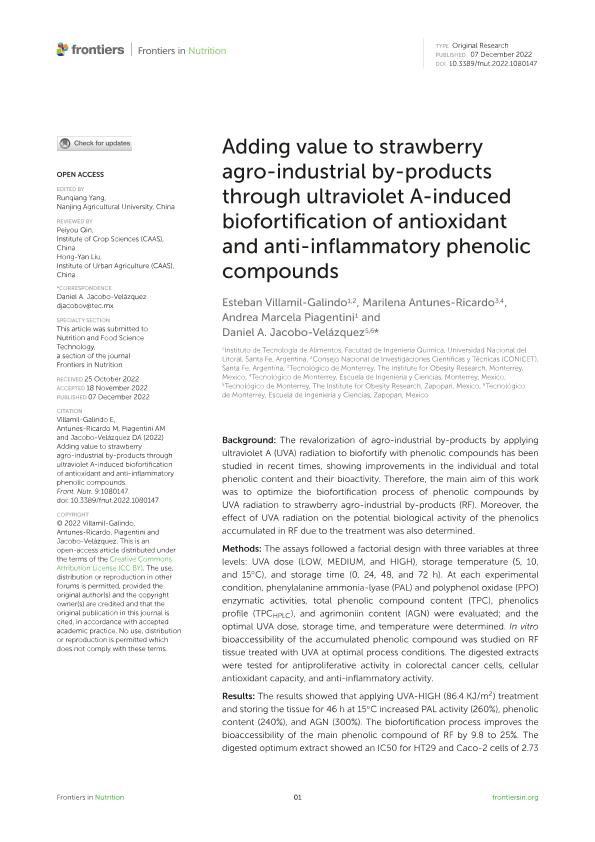Mostrar el registro sencillo del ítem
dc.contributor.author
Villamil Galindo, Johan Esteban

dc.contributor.author
Antunes Ricardo, Marilena
dc.contributor.author
Piagentini, Andrea

dc.contributor.author
Jacobo Velázquez, Daniel A.
dc.date.available
2023-12-26T13:22:56Z
dc.date.issued
2022-12
dc.identifier.citation
Villamil Galindo, Johan Esteban; Antunes Ricardo, Marilena; Piagentini, Andrea; Jacobo Velázquez, Daniel A.; Adding value to strawberry agro-industrial by-products through ultraviolet A-induced biofortification of antioxidant and anti-inflammatory phenolic compounds; Frontiers Media; Frontiers in Nutrition; 9; 12-2022; 1-19
dc.identifier.issn
2296-861X
dc.identifier.uri
http://hdl.handle.net/11336/221372
dc.description.abstract
Background: The revalorization of agro-industrial by-products by applying ultraviolet A (UVA) radiation to biofortify with phenolic compounds has been studied in recent times, showing improvements in the individual and total phenolic content and their bioactivity. Therefore, the main aim of this work was to optimize the biofortification process of phenolic compounds by UVA radiation to strawberry agro-industrial by-products (RF). Moreover, the effect of UVA radiation on the potential biological activity of the phenolics accumulated in RF due to the treatment was also determined. Methods: The assays followed a factorial design with three variables at three levels: UVA dose (LOW, MEDIUM, and HIGH), storage temperature (5, 10, and 15°C), and storage time (0, 24, 48, and 72 h). At each experimental condition, phenylalanine ammonia-lyase (PAL) and polyphenol oxidase (PPO) enzymatic activities, total phenolic compound content (TPC), phenolics profile (TPCHPLC), and agrimoniin content (AGN) were evaluated; and the optimal UVA dose, storage time, and temperature were determined. In vitro bioaccessibility of the accumulated phenolic compound was studied on RF tissue treated with UVA at optimal process conditions. The digested extracts were tested for antiproliferative activity in colorectal cancer cells, cellular antioxidant capacity, and anti-inflammatory activity. Results: The results showed that applying UVA-HIGH (86.4 KJ/m2) treatment and storing the tissue for 46 h at 15°C increased PAL activity (260%), phenolic content (240%), and AGN (300%). The biofortification process improves the bioaccessibility of the main phenolic compound of RF by 9.8 to 25%. The digested optimum extract showed an IC50 for HT29 and Caco-2 cells of 2.73 and 5.43 μg/mL, respectively, and presented 60% cellular antioxidant capacity and 30% inhibition of NOX production. Conclusion: The RF treated with UVA is an excellent source of phenolic compounds; specifically, ellagitannins and the UVA radiation proved to be efficient in biofortify RF, significantly improving the phenolic compounds content and their bioactive properties with adequate bioaccessibility, adding value to the strawberry agro-industrial by-products.
dc.format
application/pdf
dc.language.iso
eng
dc.publisher
Frontiers Media

dc.rights
info:eu-repo/semantics/openAccess
dc.rights.uri
https://creativecommons.org/licenses/by-nc-sa/2.5/ar/
dc.subject
BIOFORTIFICATION
dc.subject
CIRCULAR ECONOMY
dc.subject
ELLAGITANNINS
dc.subject
POSTHARVEST ABIOTIC STRESSES
dc.subject
REVALORIZATION
dc.subject
UV RADIATION
dc.subject.classification
Alimentos y Bebidas

dc.subject.classification
Otras Ingenierías y Tecnologías

dc.subject.classification
INGENIERÍAS Y TECNOLOGÍAS

dc.title
Adding value to strawberry agro-industrial by-products through ultraviolet A-induced biofortification of antioxidant and anti-inflammatory phenolic compounds
dc.type
info:eu-repo/semantics/article
dc.type
info:ar-repo/semantics/artículo
dc.type
info:eu-repo/semantics/publishedVersion
dc.date.updated
2023-12-26T11:22:45Z
dc.journal.volume
9
dc.journal.pagination
1-19
dc.journal.pais
Suiza

dc.journal.ciudad
Lausanne
dc.description.fil
Fil: Villamil Galindo, Johan Esteban. Universidad Nacional del Litoral. Facultad de Ingeniería Química. Instituto de Tecnología de los Alimentos; Argentina. Consejo Nacional de Investigaciones Científicas y Técnicas. Centro Científico Tecnológico Conicet - Santa Fe; Argentina
dc.description.fil
Fil: Antunes Ricardo, Marilena. Instituto Tecnologico de Monterrey. Escuela de Ingenieria y Ciencias.; México
dc.description.fil
Fil: Piagentini, Andrea. Universidad Nacional del Litoral. Facultad de Ingeniería Química. Instituto de Tecnología de los Alimentos; Argentina
dc.description.fil
Fil: Jacobo Velázquez, Daniel A.. Instituto Tecnologico de Monterrey. Escuela de Ingenieria y Ciencias.; México
dc.journal.title
Frontiers in Nutrition
dc.relation.alternativeid
info:eu-repo/semantics/altIdentifier/url/https://www.frontiersin.org/articles/10.3389/fnut.2022.1080147/full
dc.relation.alternativeid
info:eu-repo/semantics/altIdentifier/doi/http://dx.doi.org/10.3389/fnut.2022.1080147
Archivos asociados
